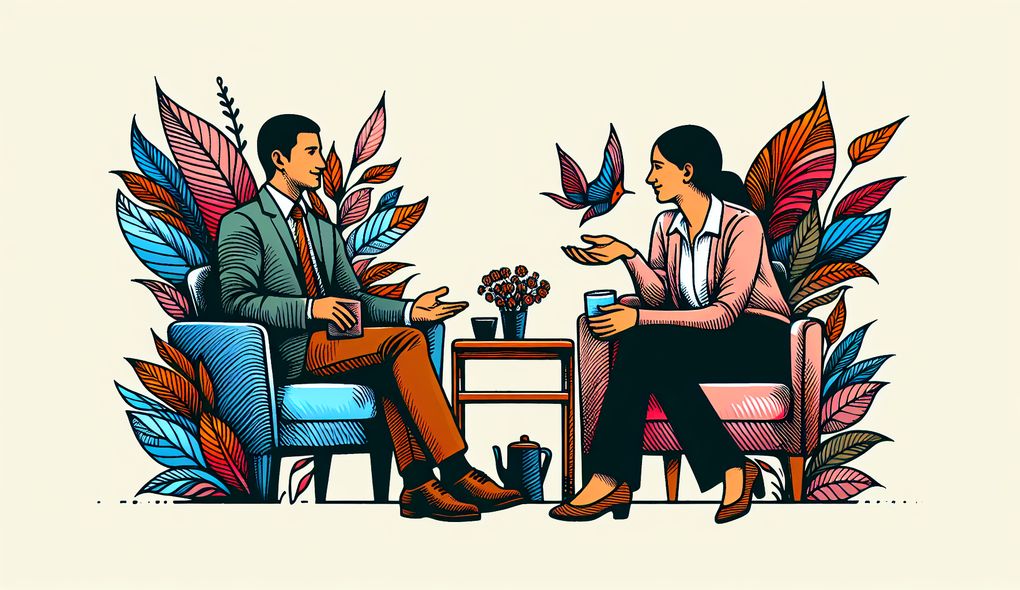Explain your understanding of the role of a marriage therapist in helping couples understand and resolve conflicts.
JUNIOR LEVEL

Sample answer to the question:
As a marriage therapist, my role is to assist couples in understanding and resolving conflicts that arise in their relationships. I will provide counseling to couples of various backgrounds and help them improve their communication and address emotional and interpersonal issues. By applying therapeutic techniques, I will guide clients towards effective communication and rebuilding trust. Additionally, I will create personalized treatment plans based on each couple's needs and goals. It is important for me to maintain thorough and confidential records of all client interactions while staying updated with the latest research and best practices in marriage therapy.
Here is a more solid answer:
In my role as a marriage therapist, I understand the importance of strong communication and interpersonal skills to foster a safe and supportive environment for couples. I approach each session with empathy and sensitivity, recognizing the unique challenges and emotions that couples bring. I have extensive knowledge of therapeutic modalities and interventions specific to couple's therapy, and I tailor my approach to meet the needs of each couple. By utilizing problem-solving skills and conflict mediation techniques, I guide couples in addressing and resolving conflicts. Organization and attention to detail are crucial in maintaining thorough and confidential records of client interactions. I am committed to ongoing professional development, staying up-to-date with the latest research and best practices in the field of marriage therapy.
Why is this a more solid answer?
The solid answer expands on the basic answer by providing more specific details and examples. It highlights the importance of strong communication and interpersonal skills, empathy, knowledge of therapeutic modalities, problem-solving skills, and attention to detail. It also emphasizes the commitment to professional development. However, it can be further improved by incorporating examples of past experiences and demonstrating a deeper understanding of diverse cultures and backgrounds.
An example of a exceptional answer:
As a marriage therapist, I play a crucial role in helping couples navigate complex emotional landscapes and develop healthier relationships. Through my strong communication and interpersonal skills, I create a safe space for couples to express their thoughts and emotions. By actively listening and demonstrating empathy and sensitivity, I foster trust and understanding between partners. My extensive knowledge of therapeutic modalities allows me to tailor interventions to the unique needs of each couple, empowering them to communicate effectively and resolve conflicts. I utilize evidence-based techniques such as Emotionally Focused Therapy (EFT) and Cognitive-Behavioral Therapy (CBT) to facilitate positive changes in their relationship dynamics. With my strong problem-solving skills and conflict mediation abilities, I guide couples in finding mutually satisfactory resolutions to their issues. As a detail-oriented therapist, I maintain comprehensive records while ensuring utmost confidentiality. I prioritize ongoing professional development by attending workshops, conferences, and staying updated with current research and literature in the field of marriage therapy.
Why is this an exceptional answer?
The exceptional answer goes above and beyond in demonstrating a deep understanding of the role of a marriage therapist and the necessary skills and techniques involved. It showcases the candidate's ability to create a safe and supportive environment, actively listen, and apply evidence-based therapeutic modalities. The answer also highlights the candidate's problem-solving and conflict mediation abilities, attention to detail, and commitment to professional development. It provides specific examples of therapeutic approaches like Emotionally Focused Therapy (EFT) and Cognitive-Behavioral Therapy (CBT). The only area for improvement would be to further emphasize the candidate's understanding of diverse cultures and backgrounds and how they can impact relationships.
How to prepare for this question:
- Familiarize yourself with various therapeutic modalities and interventions specific to couple's therapy, such as Emotionally Focused Therapy (EFT) and Cognitive-Behavioral Therapy (CBT). Understand their principles and how they can be applied in different situations.
- Develop your communication and interpersonal skills by practicing active listening, empathy, and creating a safe and non-judgmental environment.
- Reflect on past experiences where you successfully helped couples resolve conflicts and improve their relationships. Be prepared to discuss specific techniques or interventions you utilized.
- Research and stay updated with the latest research, trends, and best practices in the field of marriage therapy. Attend workshops, conferences, or online courses to enhance your knowledge and skills.
- Consider the impact of diverse cultures and backgrounds on relationships. Be prepared to discuss how you would address these factors in therapy sessions.
What are interviewers evaluating with this question?
- Communication and interpersonal skills
- Empathy and sensitivity
- Knowledge of therapeutic modalities
- Problem-solving skills and conflict mediation
- Organization and attention to detail
- Commitment to professional development

